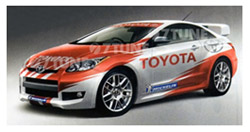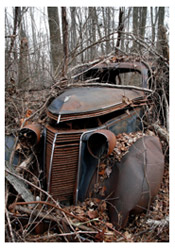A few days apart in April 2008, four major automakers made announcements about two separate partnerships between them.
The proclamations were not so stimulating for car buyers, but these alliances definitely deserve a closer look.
One Big Happy Family
Image from Diesel Station
 First, officials for Toyota and Subaru said the Japanese automakers will team to develop a sports car with a box engine, which we will see hopefully around 2011.
First, officials for Toyota and Subaru said the Japanese automakers will team to develop a sports car with a box engine, which we will see hopefully around 2011.
Days later, and probably more interestingly, Nissan and Chrysler announced that they will be producing cars for each other.
Chrysler plans to make a full-size pickups for Nissan, based on the Dodge Ram, and Nissan will produce a smaller car for Chrysler.
Both companies are very public about the budding working relationships between them.
How This Affects You
What does this mean for those who buy or sell cars?
Partnerships and alliances have been a part of the automotive industry since the beginning and the results are all around us on the roads today.
Will the new Toyota sports car put a dent in Porsche’s section of the market?
Will Chrysler be able to produce a truck model that is superior to the already well-selling Nissan Frontier?
Of course these answers won’t be available for years.
Auto enthusiasts may want to monitor the developments – kind of like watching sports scores.
Strange Bedfellows?
 The Nissan-Chrysler alliance seems to make sense, both companies want to expand their reach outside of their home turf.
The Nissan-Chrysler alliance seems to make sense, both companies want to expand their reach outside of their home turf.
Chrysler does not have a subcompact car so tapping a Japanese automaker for assistance is a good move.
On the other hand, Toyota getting in to the sports car market at this point in the game is rather peculiar.
In fact, the company is calling this Subaru collaboration as an “affordable compact” which is even more unusual.
Automakers Have Been Doing it for Years
Then again, there have been strange bedfellows before in the industry.
Porsche and Volkswagen
Ferdinand Porsche himself created the Beetle for Volkswagen before World War II.
Today Porsche still owns a significant amount of stock in Volkswagen and even recently hinted that it plans to buy the remaining stock for control of the VW brand.
 And that isn’t even the strangest alliance in automotive history.
And that isn’t even the strangest alliance in automotive history.
Mercedes Benz and Studebaker
In the late 1950s, Mercedes-Benz inked a distribution agreement with the Studebaker-Packard Corporation. The agreement allowed Studebaker to use the Mercedes-Benz name in its advertisements.
This agreement remained in effect for several years, until Studebaker’s American operations ended in 1963.
At which point many Studebaker dealers converted to become Mercedes-Benz dealerships.
Imagine that – going from selling Studebakers to selling Mercedes-Benz vehicles. Maybe back then it wasn’t as far-fetched – but today, it seems almost comical.
Mercedez Benz and Chrysler
DaimlerChrysler was created in 1998 when the manufacturer of Mercedes-Benz, Daimler-Benz and the Chrysler Corporation merged.
The idea was to create a powerful automaker to benefit consumers in two hemispheres.
Unfortunately that’s not how it worked out.
By May 2007 Chrysler was sold to a private equity firm that specializes in fixing companies with challenges.
By that fall the German mother company was called simply Daimler, and the American branch was working under the name Chrysler LLC.
 Chrysler still remains the biggest private automaker in North America. However if it couldn’t get a branding boost from a name like Mercedes-Benz, one must wonder what the company plans to do next.
Chrysler still remains the biggest private automaker in North America. However if it couldn’t get a branding boost from a name like Mercedes-Benz, one must wonder what the company plans to do next.
Only the Future Will Tell
What will become of the Toyota-Subaru and Nissan-Chrysler alliances?
We imagine they will produce some interesting new vehicles, but what will that mean long-term for the companies?
More than almost any other industry, automotive history offers plenty examples of partnerships that were initially well received, but that didn’t achieve the desired results
